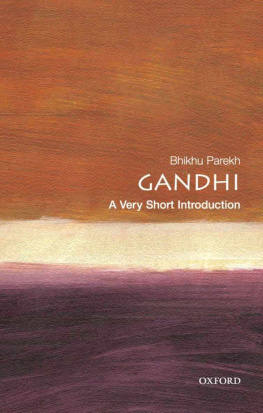Routledge Revivals
The Concept of Socialism
First published in 1975, this book explores in depth the concept of socialism. The contributors to the book, all both socialists and academics, explore the philosophical ideas behind the concept, as well as offering thoughtful analyses of topics such as Division of Labour and Womens Liberation. Editor Parekh shows with this book that socialism is not merely an economic theory but a comprehensive view of life characterised by, among other things, a distinctive conception of man, rationality, and knowledge. Between them the contributors cover the essential aspects of socialist thought and provide a stimulating survey of the dilemmas facing contemporary socialist thinkers.
First published in 1975
by Croom Helm
This edition first published in 2018 by Routledge
2 Park Square, Milton Park, Abingdon, Oxon, OX14 4RN
and by Routledge
711 Third Avenue, New York, NY 10017
Routledge is an imprint of the Taylor & Francis Group, an informa business
1975 Bhikhu Parekh
All rights reserved. No part of this book may be reprinted or reproduced or utilised in any form or by any electronic, mechanical, or other means, now known or hereafter invented, including photocopying and recording, or in any information storage or retrieval system, without permission in writing from the publishers.
Publishers Note
The publisher has gone to great lengths to ensure the quality of this reprint but points out that some imperfections in the original copies may be apparent.
Disclaimer
The publisher has made every effort to trace copyright holders and welcomes correspondence from those they have been unable to contact.
A Library of Congress record exists under ISBN: 75310262
ISBN 13: 978-1-138-56935-5 (hbk)
ISBN 13: 978-0-203-70413-4 (ebk)
Discussion of political doctrines such as Liberalism, Conservatism and Socialism is an exceedingly hazardous enterprise. There are no clear criteria by which their identity can be determined, and this unavoidably leads to their caricature. F. A. Hayek, for example, presents an extremely odd picture of Conservatism when he asserts, among other things, that the Conservative is essentially opportunist and lacks principles, is not much interested in limiting the powers of government, does not really believe in the power of argument, and rejects well-substantiated new knowledge simply because he dislikes some of the consequences which seem t6 follow from it. Spitzs equation of the Liberal with the rational man and his dismissal of all non-liberals as bigoted fanatics is not peculiar to him; it is to be found in many a liberal writer.
The fallacy is not peculiar to the Liberal; it is committed by Conservative and Socialist writers too. Several Conservative philosophers have conveniently defined their doctrine in terms of political realism, sense of history, appreciation of the role of passions in human life and love of order, and nave directly or by implication so defined other political doctrines as to make one wonder how any decent human being could ever subscribe to them. Socialist writers too have sometimes defined socialism in terms of equality, justice, decentralisation of power and protection of minorities, thus depriving rival political doctrines of almost all humanistic content. Each political doctrine defines itself, and is defined by others, in a manner that suits their respective interests. It may or may not be true that to a Westerner all Chinese look alike, but certainly it seems true that to a political doctrine all its rivals look more or less alike.
Why this is so is a very difficult question that we cannot pursue here in detail. Excepting cases where writers deliberately use their theoretical analysis as a vehicle for subtle and not so subtle ideological propaganda, or where they lack adequate knowledge of the history of a doctrine, two factors seem responsible. First, social and political thought has an inescapable ideological basis, and a writers thought - his definition and analysis of concepts included is unavoidably influenced by his moral, cultural, political and other biases. Second, we have not so far devoted enough thought to the analysis of the logical structure of political doctrines and inquired where precisely to locate their identity. Political doctrines are highly complex and fluid conceptual structures, with one foot in the world of abstract ideas and the other in the humdrum world of human practice. Unless we know where to look for their identity, we are bound to end up misunderstanding them. Of the two factors, nothing more can be said about the first than that each writer should be rigorously self-critical and that others should criticise and expose his biases. Developing criteria for determining the identity of political doctrines cannot by itself of course put an end to the caricature referred to earlier, but it can at least minimise it.
Broadly speaking, a political doctrine such as Conservatism, Liberalism and Socialism is an attempt to present a specific conception of man and society the type of creature man is, his basic needs and motivations, the way he is and ought to be related to other men, the form of life best suited to him, the role of government in the life of community, etc. A conception of man raises two types of problems: first justificational or philosophical, and second, implementational or programmatic. It competes with others for the loyalty of men and is therefore required both to justify itself and to show why it should be accepted in preference to others. Further a political doctrine by its very nature is practically orientated and seeks to achieve a particular type of society. It therefore needs to work out concrete policies, proposals and the organisational structure needed to realise them. Every carefully worked out political doctrine therefore has a tripartite structure. First, it has a more or less well articulated metaphysic, a general view of the universe, that provides justification for its conception of man and society. Second, it has a specific conception of man and society which constitutes its core. And third, it has a programmatic content intended to show how its view of man and society is to be realised.
The relationship between a doctrines conception of man and society and its programmatic and philosophical content is necessarily contingent. The policies and the institutional structure recommended by a political doctrine are inescapably conditioned by the circumstances and the stage of development of the society in which the doctrine operates, and sometimes by the tactical need for expediency. As society changes, it throws up new problems and changes the context of old problems, and requires new solutions. Liberalism, for example, is not necessarily committed to laissez-faire because under certain circumstances, it might find that liberal values can be preserved only by state intervention; nor is it committed to argument and persuasion, since it may at times have to resort to other methods to make the voice of moderation heard, as liberals in the developing countries and in America and elsewhere are beginning to realise. No political doctrine can therefore remain committed to and defined in terms of a particular policy or method of social change.












